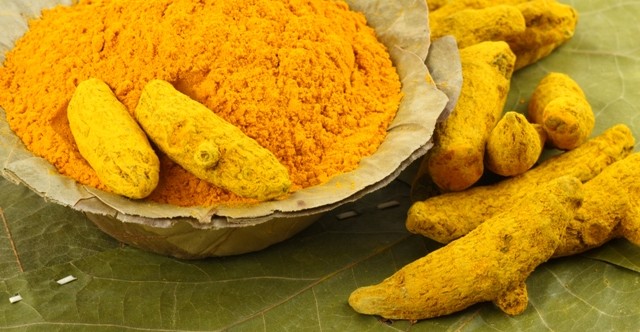Turmeric
Turmeric

Known as kasturi manjal, turmeric has been used in Asia for thousands of years and is a major part of Ayurveda medicine for its medicinal properties. It is also nick named as the ‘golden spice of life’ by the West. Curcumin, which constitutes 3.16% of turmeric powder, has a distinct bright yellow colour with earthy, slightly bitter and a mustardy smell. The active compound curcumin is believed to have a wide range of biological effects including anti-inflammatory, antioxidant, antitumour, antibacterial and antiviral activities.
Turmeric’s antioxidant properties protect the cells from free radical damage. The antioxidant content within turmeric comes from active compounds called curcuminoids. These curcuminoids give antioxidants that can be 3 times more powerful than grape seed extract and strong enough to scavenge the hydroxyl radical – considered by many to be the most reactive of all oxidants that damage human body the most.
In India, turmeric has been used traditionally for thousands of years as a remedy for stomach and liver ailments, as well as topically to heal scars and wounds because of its antimicrobial property. In the Siddha medicine, turmeric was a medicine for a range of diseases of skin, lungs, and gastrointestinal systems, aches, pains, wounds, sprains, and liver disorders. A fresh juice is commonly used in many skin conditions like eczema, shingles and allergy. It also helps in maintaining a healthy digestive system, supporting the healthy bones, joints, and the entire skeletal tissues.
Turmeric may be helpful in preventing the blockage of arteries. Turmeric may help in keeping the bad cholesterol levels low and inhibits the oxidation of LDL (bad cholesterol). Oxidized LDL deposits in the walls of blood vessels contributing to the formation of atherosclerotic plaque. Turmeric may also prevent platelet build up along the walls of an injured blood vessel.
Turmeric is also recognized as an important adaptogen helping to support the body against oxidative stress, adrenal fatigue and chronic fatigue syndrome.
Clinical trials are going on for the use of turmeric to treat cancer, doses needed for any effect are difficult to establish in humans so far. But traditional Eastern Medicine has the well-known established effects of Turmeric way back before modern medicine was established. Turmeric is best for purification of the chakras, as well as purifying the path of the subtle physical body.
Although typically used in its dried, powdered form in curries and soups, turmeric stem is also used fresh, like ginger. Combination of Turmeric and Honey helps boost the immunity (Dosage: 1 tsp Turmeric powder + 1 tsp Honey).
Turmeric #My tips

Boil about 100-150 ml of water and add about 2 grams of turmeric powder to the boiled water. Stir it, and let it cool down for a few minutes. Add a pinch of fresh ground black pepper. You can also enhance the taste and potential benefits of the turmeric by adding freshly grated ginger, with 1 teaspoon of Manuka honey. Turmeric is rich in iron, so turmeric tea can potentially help in symptoms of anaemia, tiredness and even chronic fatigue syndrome.
Another way of taking Turmeric: Mix about 1/4th teaspoon of turmeric powder into a glass of warm or per boiled milk. Drinking a cup of this mixture 2 to 3 times daily may reduce the effects of asthma, Upper respiratory tract infections and also sore throats. This medicinal mixture works even better when it is taken on an empty stomach while suffering from any colds, flus or asthma.
Vitamin and Mineral Content of Turmeric: It has a small amount of vitamin C, B6 and choline, it also contains vitamin K, niacin, and folic acid in trace amounts. It is also rich in potassium, phosphorus, calcium and magnesium.
